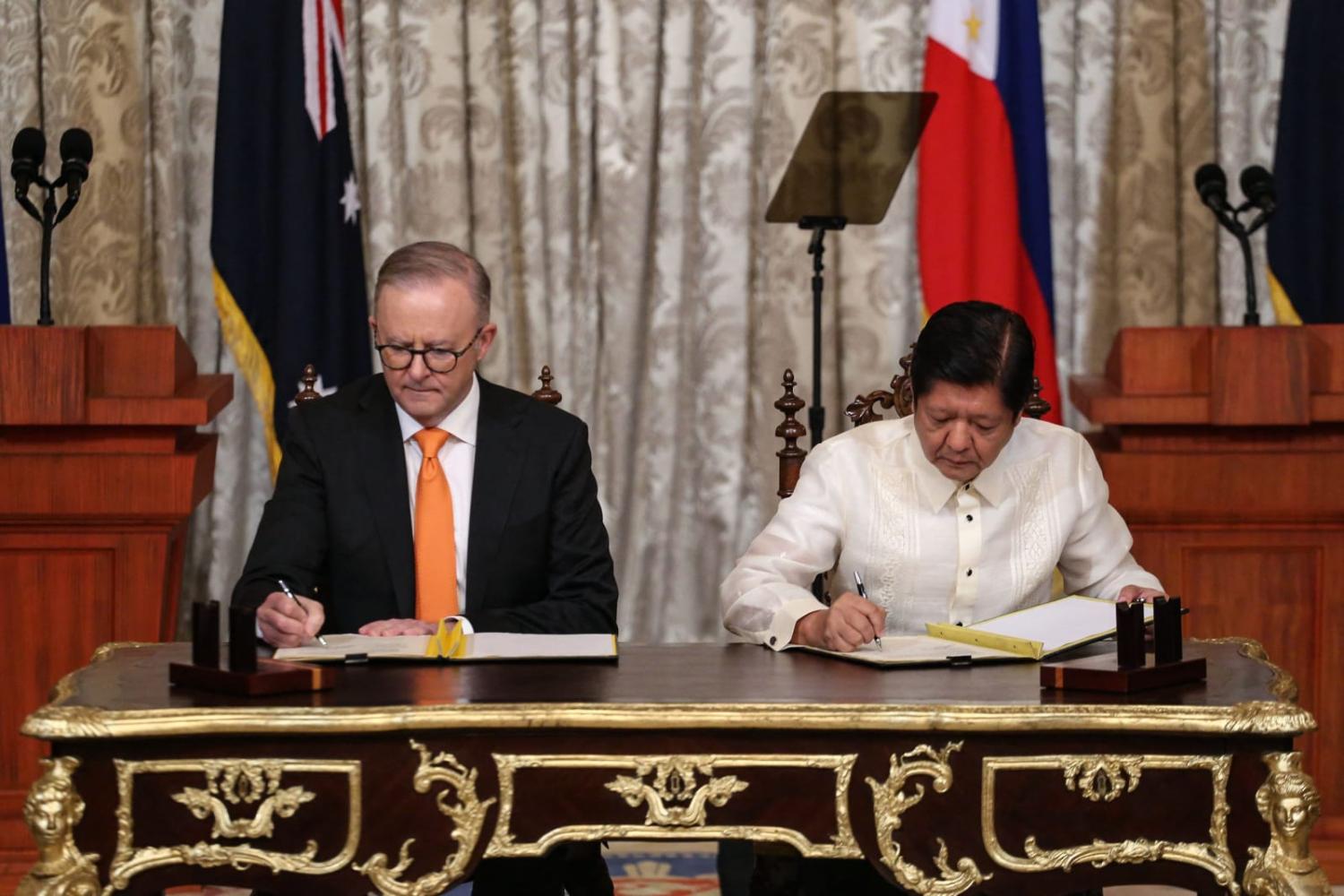There has been ongoing debate for several years now over whether the current era of “strategic competition” constitutes a “new Cold War”. Analogies have been cast about with varying degrees of precision and temperance, with a “new 1938” or “new 1914” event seemingly lurking around every rhetorical corner.
While mindful of not heading down the same path – and acknowledging the important differences between the Cold War and today – one of the notable parallels has been the marked resurgence in the establishment or reinvigoration of formal security agreements, much as took place in the early 1950s.
The Quad and AUKUS are the two most prominent examples of this phenomenon in the Indo-Pacific, and NATO has also demonstrated an interest in expanding its footprint into the region with its proposal for a liaison office in Tokyo.
In Europe, Finland and Sweden have applied to join NATO, and in the Middle East there have been discussions about a new mutual defence treaty between the United States and Saudi Arabia as a quid pro quo for the normalisation of Israeli-Saudi relations. This would reportedly be modelled on the US alliances with Japan and South Korea.
It pays to look closer to home, too. Australia has consistently been an active and independent participant in the development of regional security agreements, both in Asia and the Pacific.
Most recently, on 22 October 2022, the prime ministers of Australia and Japan signed a Joint Declaration on Security Cooperation; establishing what has been dubbed a “quasi-alliance”. For the following decade, the parties agreed to “consult each other on contingencies that may affect our sovereignty and regional security interests, and consider measures in response”.
This passage is especially notable for its similarity to Article III of the ANZUS Treaty, which states that “the Parties will consult together whenever in the opinion of any of them the territorial integrity, political independence or security of any of the Parties is threatened in the Pacific”.
While the language of “consultation” in the Joint Declaration lacks the strength of the subsequent obligation under Article IV of ANZUS for each party to “act to meet the common danger in accordance with its constitutional processes”, it still carries significant diplomatic weight.
While officially Australia only has two allies – New Zealand and the United States – if the obligation to consult is to be regarded as constituting a “quasi-alliance”, then this joint declaration is only the most recent of three such agreements that Australia maintains in the Indo-Pacific.
The second, and oldest, is the 1971 Five Power Defence Arrangements (FPDA) between Australia, Malaysia, New Zealand, Singapore, and the United Kingdom. While its members generally prefer the institution to keep a low profile, the FPDA’s founding communique states that “in the event of any form of armed attack externally organised or supported or the threat of such attack against Malaysia or Singapore”, the members will “immediately consult” with each other “for the purpose of deciding what measures should be taken jointly or separately in relation to such attack or threat”.
A key development came at the recent FPDA Defence Chiefs’ Conference on 3 October 2023, when the parties declared a renewed intention to “bolster [their] capacity for conventional and non-conventional operations”. While conventional operations have always remained at the core of the FPDA, this is a notable pivot to place them back at the forefront of the public agenda after several decades emphasising new areas of cooperation such as humanitarian assistance and disaster relief, counter-piracy, and counter-terrorism.
The third of Australia’s consultative “quasi-alliances” was established in the 1987 Joint Declaration of Principles between Australia and Papua New Guinea. This agreement states that the two governments would, “in the event of external armed attack threatening the national sovereignty of either country”, consult together “for the purpose of each Government deciding what measures should be taken, jointly or separately, in relation to that attack”. Negotiations are presently underway with the intention of finalising a Bilateral Security Treaty, but the details are still forthcoming.
While the Quad, AUKUS, and these bilateral agreements are not alliances, let alone constituting an “Asian NATO”, there is seemingly a renewed appetite in the Indo-Pacific for more formal and institutionalised security partnerships. This is something that Foreign Minister Penny Wong has emphasised, calling for Australia to pursue a policy of “strategic equilibrium” and contribute to a multipolar “regional balance of power”.
In further pursuit of these goals, since 2022 Australia has also signed a Bilateral Security Agreement with Vanuatu, a Status of Forces Agreement with Fiji, and a Defence Cooperation Agreement with Timor-Leste. It has not all been smooth sailing, however, as there is still ongoing debate in Papua New Guinea and Vanuatu about their agreements with Australia – in Vanuatu’s case especially complicated by having had three prime ministers in as many months.
This may yet prove to be a brief flurry of activity without further action. But there are signs that the world has entered a new era of alliances, pacts, and treaties; one in which Australia is taking the lead in seeking to build a more stable and secure region.

